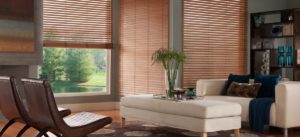Window Orientation: Why It Matters When Choosing Window Treatments
 The term “window orientation” refers to the compass direction a window faces, based on the placement of a home on a lot. The orientation affects the window’s sun exposure, and that’s why it matters when you’re selecting window treatments. The sun rises in the east, sets in the west, and has a fairly predictable pattern of beaming heat and light into a home from various angles as each day progresses from morning to night. Savvy homeowners can take advantage of this solar behavior to help lower their indoor climate control costs.
The term “window orientation” refers to the compass direction a window faces, based on the placement of a home on a lot. The orientation affects the window’s sun exposure, and that’s why it matters when you’re selecting window treatments. The sun rises in the east, sets in the west, and has a fairly predictable pattern of beaming heat and light into a home from various angles as each day progresses from morning to night. Savvy homeowners can take advantage of this solar behavior to help lower their indoor climate control costs.
How Window Orientation Affects Your Home’s Energy Efficiency
Understanding how the sun enters your windows from any given direction can help you choose the best window treatments to keep your heating and cooling costs in check. For example, windows that face west and east receive the most direct sunlight and radiant heat, although the time of day will vary.
Windows that face east allow solar heat to invade during the morning hours, while west-facing windows welcome heat (possibly too much of it!) during the afternoons. Therefore, it’s a good idea to select window treatments you can count on to seasonally control heat infiltration at the right time of day, blocking it during the summer and harnessing it to your advantage in the winter. If you don’t want to worry about opening and closing blinds, shades, or drapes at the perfect time every day, consider choosing automated window treatments. These can be programmed to rise and fall on a set schedule to make the most of each window’s orientation and sun exposure.
What about south-facing windows? They don’t receive as much direct sunlight as windows that face east and west, but they can allow the sun to heat up your home during the summertime. Blinds and interior shutters are time-honored window treatments with a proven track record for reducing heat gain through windows.
On the other hand, the north side of your home tends to be the coolest. Insulating cellular shades, also known as honeycomb shades, would be an excellent choice for your north-facing windows.
Additional Conditions Apply
There are many other factors besides window orientation—including the position of shade trees on your property—that can affect how much solar heat and glare enter your home through your windows. If you’d like to get the ideal window treatments, it’s a good idea to partner with experts. Exciting Windows! has an extensive network of custom window treatment experts, and we can connect you with one that can help you evaluate your options and choose the best window coverings for your home. Contact us today to get started.

